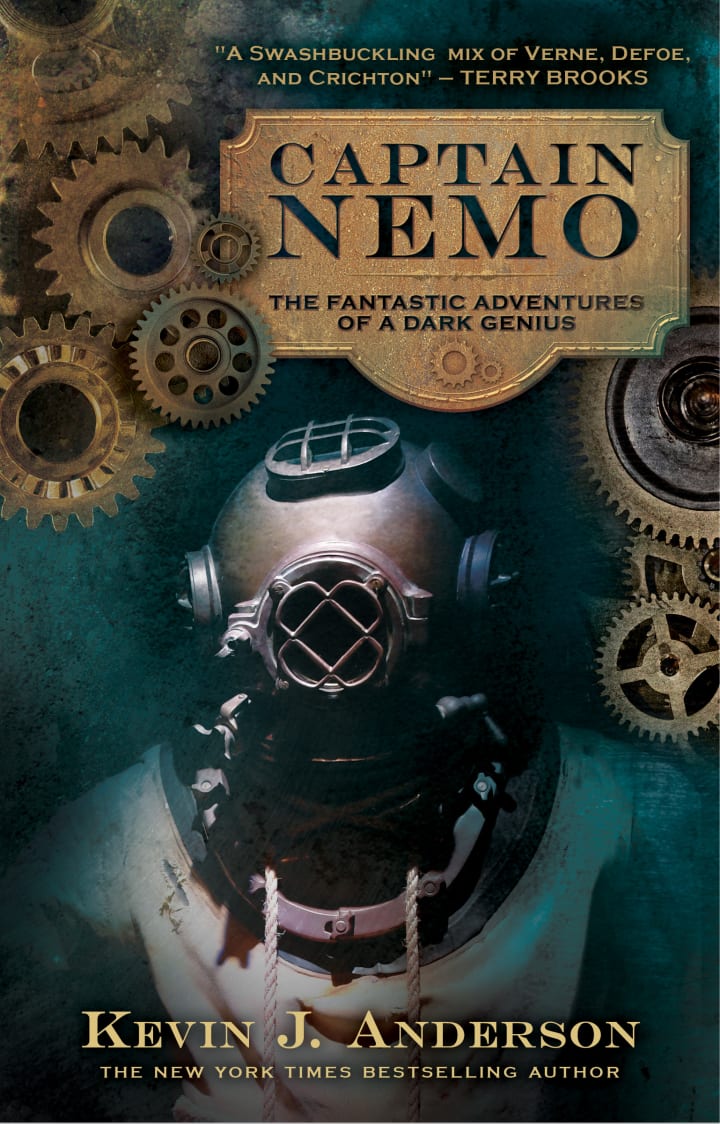Kevin J. Anderson's 'Captain Nemo'
Exploring The "True" Story Behind Jules Verne's Legendary Character

There are few authors whose works have stood the test of time more than Jules Verne. With a handful of classic novels and characters, he created timeless tales of adventure and science fiction. Suppose though that those tales and some of his most iconic characters had a basis in fact?
That is the basis of Captain Nemo, Kevin J. Anderson's 2002 novel subtitled The Fantastic History of a Dark Genius (or alternatively “The Fantastic Adventures” depending on which edition you have). The result is a treat for fans of both Verne and the steampunk genre he helped to inspire.

Going into the novel, it's important to keep in mind that Anderson is like many of those who have adapted Verne's works in the past. He is out to capture the spirit if not necessarily the exact details and characterizations that the Frenchman gave us starting more than a century and a half ago.
His Nemo is not the mysterious character Verne used twice in his writings but rather Andre Nemo, a boyhood friend of Verne's who proves able to go out into the world and put his genius to work in extraordinary situations. It's a premise that perhaps seems a bit of a cheat at first but in fact isn't as Anderson drops in elements of Verne's real life into the mix, such as the pivotal event from Verne's youth that the novel uses for the two men to part ways. It's something that both anchors the novel in some kind of reality as well as allowing Anderson to effectively have his way with Verne's creations.
Taking that as a given, there is much to enjoy here. Those familiar with both Verne's best-known works and even some of his more obscure ones will find plenty to enjoy here. There's Nemo himself, the genius engineer whose adventures take him from desert islands to commanding the most famous submarine in literature with quite a few places in-between. Along the way, he encounters the 'inspirations' for a number of Verne's characters and works from Ned Land and Robur the Conqueror to Phileas Fogg. For Verne fans, the novel is like an Easter egg hunt in finding not only the people but events from various stories and even some of the better-known adaptations of Verne's work.
One of the big accomplishments of the book is just how well it captures the spirit of Verne with a more modern eye. Verne could almost be considered the father of 'hard science fiction' and his works today can be marred down by the technical details he wrote into them.
Anderson finds a middle ground, giving enough detail to make the advanced for its time technology seem plausible in context while also not forgetting that he is writing an action/adventure tale. The novel has plenty of action pieces inspired by Verne's source material which, like the other Easter eggs, will have readers smiling in delight. Like incorporating Verne himself as a character, these help to make the fantastic seem plausible especially given the sometimes acknowledged implausible nature of events.
Something else that Anderson also is aware of is that Verne, despite characters like Nemo, was never strong on characterizations. His Nemo and Verne are both strong characters with one being able to go out into the world and the other being forced to stay home in France, both finding inspiration and friendship in the other. Perhaps more surprising is the inclusion of their mutual love interest Caroline Aronnax, a proto-feminist who is a strong presence throughout the novel's pages as she pulls against the social conventions of early to mid-19th century France. The other characters are nicely drawn, drawing on and sometimes expanding on some of Verne's own creations.
The result is that Captain Nemo is a supremely enjoyable read. Verne fans will enjoy new takes on familiar characters and plot elements while those who are perhaps looking for a good steampunk themed read will find plenty to enjoy from solid characterizations to plenty of high-tech Victoriana on display. It also stands as a good example of how one writer can take the creations of another and change them into something both familiar and refreshingly new all at once.
About the Creator
Matthew Kresal
Matthew Kresal was born and raised in North Alabama though he never developed a Southern accent. His essays have been featured in numerous books and his first novel Our Man on the Hill was published by Sea Lion Press in 2021.






Comments
There are no comments for this story
Be the first to respond and start the conversation.